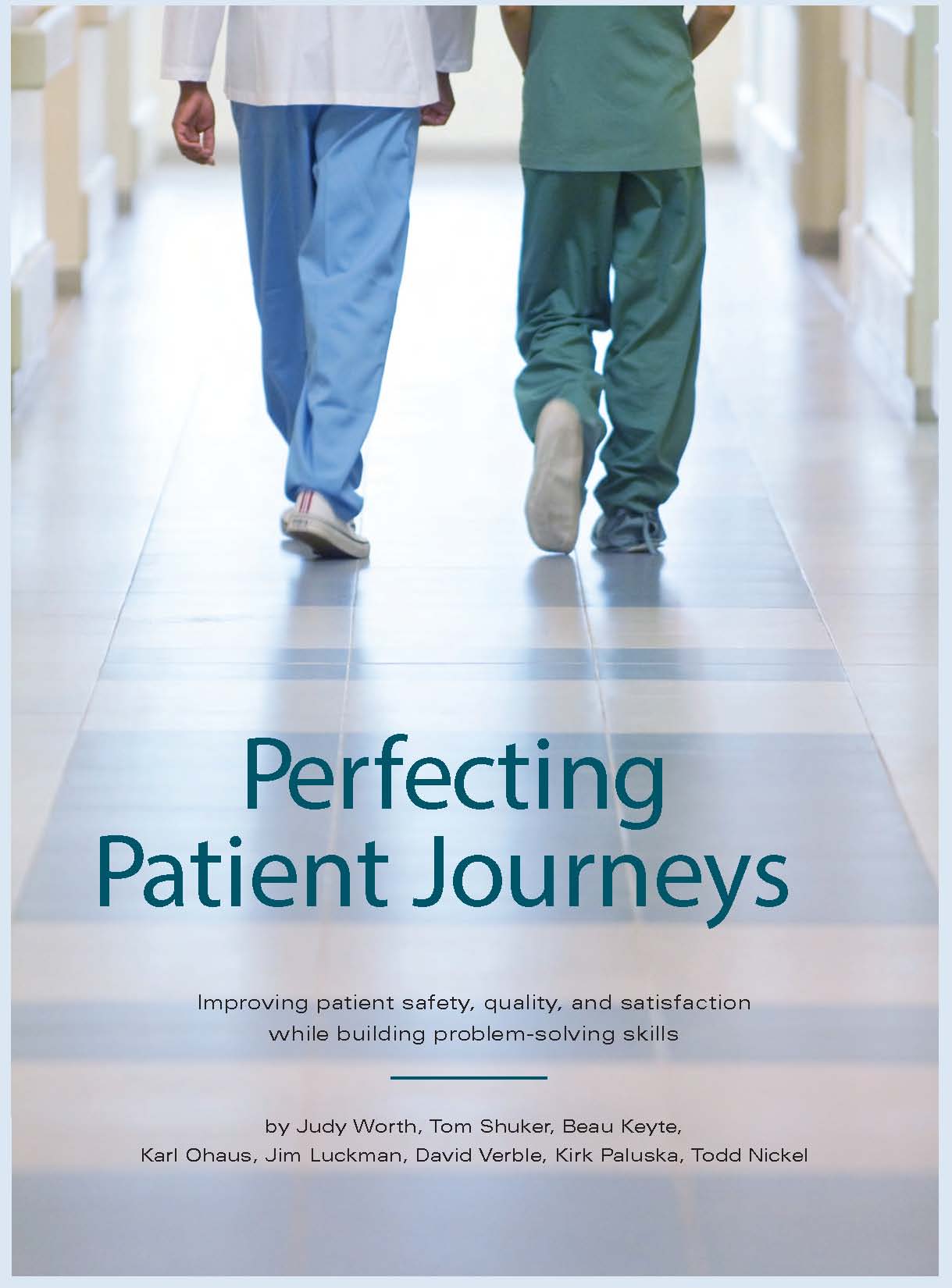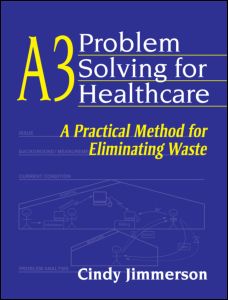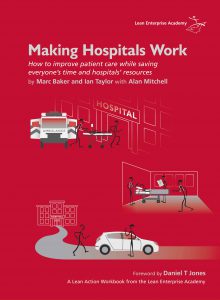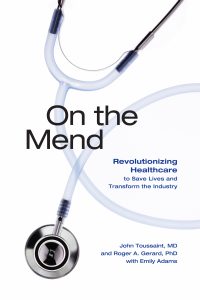£57.00
Shingo Prize Winning Book
Description
Perfecting Patient Journeys
Description
About the book
Healthcare in the United States, and around the world, is facing a crisis brought on by a combination of rising costs, lack of transparency and accountability, and preventable medical errors. Applying lean thinking to improve care is one way that healthcare organizations can engage employees in solving problems in order to deliver better and more efficient care.
Perfecting Patient Journeys is a guide for leaders of healthcare organizations who want to implement lean thinking. Readers will learn how to identify and select a problem, define a project scope, and create a shared understanding of what’s occurring in the value stream. Readers will also learn to develop a shared vision of an improved future, and how to work together to make that vision a reality.
Over the past eight years, the authors of this book have helped healthcare organizations learn how to make real and sustainable change using the value-stream improvement method. Implementing lean thinking has helped healthcare providers develop an adaptive, problem-solving culture with stunning results:
- Reduced annual staff turnover by 20%
- Average length of stay (LOS) in a large emergency department was reduced by 30%
- The number of patients who left without being seen (LWOBS) dropped by 60% in the same hospital
- Customer (patient) satisfaction increased by 73%
- Operating room changeover time was reduced, which increased the number of surgical procedures performed by 20%
Rather than rely on huge training budgets or teams of consultants, the method described in this book focuses on solving real organizational problems, and helps healthcare organizations and those who labor within them to daily provide safe, effective, efficient, and timely patient care.
Advance Praise and Reviews
“Few healthcare leaders have been trained to understand the existing state of care processes in their hospital or clinic. Perfecting Patient Journeys describes the team-based, value-stream improvement method that allows frontline healthcare staff to standardize and improve care processes. We have found in healthcare organizations throughout North America that this approach unleashes the talent and creativity of thousands of workers all focused on solving problems every day.
“Given the worldwide problem of declining value in healthcare, I cannot think of a more timely and practical resource for pursuing perfect healthcare delivery.”
John Toussaint, MD author of On the Mend and Potent Medicine, CEO emeritus of ThedaCare and CEO of the ThedaCare Center for Healthcare Value
“Perfecting Patient Journeys is the perfect field guide for leading self-directed improvement teams in healthcare. It is the Learning To See for healthcare providers and lean coaches. Our work at Martin Health Systems now follows the value-stream mapping and PDCA methodology outlined in the book, and we recently initiated a major Inpatient Service Line Value Stream Improvement Strategy applying the same process. Having buy-in from multiple stakeholders and structured follow-through on small rapid improvement events is critical to learning the concepts and maintaining progress.”
Roger Chen, Corporate Director of Performance Excellence, Martin Health Systems
“In healthcare it is difficult to see the entire process in one’s own department, never mind fully understand what the patients and families experience as they receive care throughout the hospital. Like many companies, hospitals are set up in separate and distinct departments so a patient must enter and exit these distinct vertical silos even for a simple doctor’s visit and face even more fragmentation for an inpatient stay.
“This book helps one to ‘see’ across the silos of an organization by teaching you a way to visualize the current flow (or antiflow) of patients as they navigate their way to better health and, in turn, makes obvious the waits and delays, the handoff issues, the redundancies, and the pain our patients experience so that you can design a much better system of care delivery. Perfecting Patient Journeys provides a step-wise approach that is practical and clear and will jump-start efforts of your process improvement teams.”
Alice Lee, Vice President of Business Transformation, Beth Israel Deaconess Medical Center
“Perfecting Patient Journeys is a practical guide to anyone conducting a value-stream improvement project in healthcare. It gives healthcare professionals a methodology for the overall project as well as targeted advice for every step along the way. Using this book will help healthcare organizations understand and improve the processes they use to deliver care, while also developing team members as problem solvers.”
Jeanne Kin, Special Projects Manager, University of Michigan Medical School
About the Authors
Judy Worth
Judy, a full-time consultant based in Lexington, KY, is a partner in Lean Transformations Group and co-owner of Verble, Worth & Verble. Her practice focuses on organizational development and instructional design. During her career she has worked extensively in a variety of healthcare settings. Judy spent five years as materials developer for the Kellogg-funded Computerized Office Record Review Recertification Project for the American Board of Family Medicine. She has over 20 years of experience as consultant and trainer for many of the federally designated organ and tissue procurement organizations in the United States, and for the last seven years she has worked as a consultant and trainer for the Organ Donation and Transplant Division of the United Kingdom National Health Service, helping them develop UK-wide systems for organ donation and apply/adapt relevant best practices from the U.S. Breakthrough Collaborative on Organ and Tissue Donation. Judy began her lean journey seven years ago when she provided the instructional design for Mapping to See: A Value Stream Improvement Kit for the Office and Services, published by the Lean Enterprise Institute. Since then she has cofacilitated value-stream improvement initiatives in multiple healthcare and other organizations and provided train-the-trainer development for in-house facilitators. Judy holds a BA from Harding College and an MA in Curriculum and Instruction from the University of Kentucky.
Tom Shuker
Tom, a partner in Lean Transformations Group, is a 30-year veteran in various manufacturing environments within General Motors Corp. Tom also spent two years at New United Motors Manufacturing Inc. (NUMMI), the GM-Toyota joint venture, working within the Toyota Manufacturing System and performing lean assessments of Toyota facilities in Kentucky and Japan. He has coauthored two books on lean, Value Stream Management and Value Stream Management for the Lean Office, both published by Productivity Press Inc. Tom also is a coauthor of Mapping to See: A Value-Stream Improvement Kit for Office and Service. Tom is also a member of an investment group that purchases small manufacturing firms. As part of this, Tom acted as CEO to guide a Wisconsin firm through a lean transformation, resulting in a remarkable competitive turnaround. Tom is especially energetic in promoting the application of lean principles and tools in non-manufacturing environments, including healthcare (St Mary’s Health Systems, Mayo Clinic, Michigan Hospital Association – Keystone Collaborative), government (City of Grand Rapids, State of Indiana), and financial services (GMAC, Capital One, Vanguard Financial). Tom has a Bachelor of Science degree from Michigan State University and an MBA from Western Michigan University.
Beau Keyte
Beau began his lean consulting career in the mid-1980s in the automotive industry, transitioned to adapting lean techniques to service and administrative processes in 1992, and has since progressed from implementing tools and techniques to developing and teaching the kind of self-sufficient thinking that challenges work and management processes, improves organizational performance and alignment, and sustains culture change. He now spends half of his time in the healthcare arena where he is designing new ways for organizations to engage, learn, grow, and succeed. In addition to assisting companies in implementing lean strategies, he also trains organizations in a variety of public and private settings. He is currently partner in the Lean Transformations Group and a faculty member and instructor for curricula at the Lean Enterprise Institute, the University of Michigan, and The Ohio State University. Beau is the coauthor of a number of journal articles and the Shingo-prize winning book The Complete Lean Enterprise: Value Stream Mapping for Office and Administrative Processes. He also is coauthor of Mapping to See: A Value-Stream Improvement Kit for Office and Service. Beau holds BSE and MBA degrees from the University of Michigan.
Karl Ohaus
In a 30-year professional career Karl has succeeded as a design engineer, inventor, company president, and consultant. This diverse background provides a unique perspective on the application of lean tools and techniques to help clients create process flow and improve performance. As a company president, he led the lean transformation of an automotive parts supplier. His coaching stresses the importance of management development and employee engagement for a successful change to a lean enterprise. In addition to his work with manufacturing, Karl has had a successful career consulting to the healthcare industry nationally and globally. In that work he has demonstrated the ability to understand and connect with doctors, nurses, and administrators and the passion that they bring to their mission, and has found it particularly rewarding. Karl is a partner in the Lean Transformations Group. He holds a BS in Mechanical Engineering from Duke University.
Jim Luckman
Jim has had the unique experience of leading three separate lean transformations: as a plant manager, as a director of a research and development center, and as a CEO of a small startup company. During these contrasting leadership roles, Jim realized that an effective lean transformation required understanding how to manage knowledge creation and how to lead for maximizing engagement and organizational creativity. Lean leaders must practice these behaviors in order to develop the environment for problem solving and learning by all the people in the organization. Jim has consolidated his personal experiences and is now helping clients see a more complete picture of what is required to lead a lean transformation. Jim is the past president and CEO of iPower Technologies, a company serving the distributed generation market of electrical power. He has 34 years of experience working in the auto industry at Delphi Automotive (formerly part of General Motors). He held several positions as chief engineering for engine components. SyntaxError
Today, Jim is focusing his efforts on leadership coaching, application of lean in R&D, and application of lean to software development. A partner in the Lean Transformations Group, he currently coaches companies interested in companywide lean transformation and often is asked to reengage companies who have seen a decline in their lean efforts. Jim holds a BS from Tri State University in Electrical Engineering and an MS in computer engineering from Case Western Reserve University.
David Verble
David has been a performance improvement consultant and leadership coach since 2000. Prior to that, he worked for Toyota in North America for 14 years, first as an internal change agent and later as a manager of human resource development at the plant and North American levels. He has been on the workshop faculty of the Lean Enterprise Institute for eight years and has done presentations and workshops to support a number of the LEI affiliates in the Lean Global Network. David is a partner in the Lean Transformations Group and is based in Lexington, KY, where he works through Verble, Worth & Verble. He has worked with clients in manufacturing, healthcare, finance, and higher education in North America, Europe, Asia, and Australia. His work has focused on supporting clients in process improvement, development of lean management systems and practices, strategic thinking and problem solving, and leadership coaching for managers and executives. He has a graduate degree in instructional systems and performance technology and training in consulting psychology. David’s primary experience in healthcare has been an eight-year relationship with a hospital in Canada. His other work in healthcare has included projects at Mayo Clinic and University of Michigan Health System.
Kirk Paluska
Kirk has held operations management positions in both high-tech manufacturing and service companies, including National Semiconductor, JDS Uniphase, and Enservio. Kirk has led lean deployments as well as the development of right-sized IT systems in service, healthcare, and manufacturing. He also was a consultant with the TWI Network and Lean Transformations Group where he helped a variety of companies incorporate lean thinking into their frontline operations, back offices, and management systems. Kirk is a faculty member of the Lean Enterprise Institute. He is a codeveloper of LEI’s Transformational Leadership workshop and a coauthor of Mapping to See: A Value-Stream Improvement Kit for Office and Service. Kirk has an MBA in Operations and Accounting from the University of Michigan and a BS in Electrical Engineering from Swarthmore College.
Todd Nickel
Todd has more than 15 years of experience leading continuous improvement in the food, automotive, and healthcare industries. Todd began his career as an industrial engineer, expanding responsibilities to include production supervision, operations management, and continuous improvement management within the automotive and food industries. This diverse experience and hands on implementation have allowed Todd the ability to reach sustainability through floor-level engagement and the development of problem solving at all levels of the organization. In addition to work in manufacturing, Todd has consulted with organizations seeking to implement continuous improvement for over 10 years, including healthcare work in pharmacy, sterile processing, and laboratory operations. Todd has acted as the primary lean training provider for Michigan Technical Education Center in Southwest Michigan since 2002. Todd received a Bachelor of Science in Industrial Engineering from Western Michigan University.
Author Q&A
An interview with the authors of Perfecting Patient Journeys
Q: Why did you decide to write this book?
A: Our hope is that this guide will help healthcare professionals deliver safe, high-quality, cost-effective care, and to deliver all of the support services for the efficient and cost-effective delivery of that care. The message is aimed directly at leaders who want improvement and change across their organizations- improved patient safety and quality and improved work life for those delivering care and providing support services. These leaders recognize that the individuals involved in delivering health care know the most about their work and are the key to changing and improving work and value streams.
Q: If the problem of the rising cost of health care is going to be solved, what are the central elements to doing that?
A: This book deals primarily with improving the efficiency of the delivery of services and thus reducing the cost. For solving that problem, we think healthcare providers need to:
- Identify and agree on a problem
- Collaboratively develop a set of potential solutions to the problem
- Experiment in order to find the best solution to address the problem
- Communicate, share, and learn from the results
Q: What, in essence will Perfecting Patient Journeys help healthcare providers do? What are some measurable results of this kind of exercise?
A: For the past eight years we have helped healthcare organizations learn how to make real and sustainable change using the value stream improvement method. Results at these organizations have included a reduced average length of stay, increased customer satisfaction scores dramatically, reduced annual staff turnover, and other significant and measurable results that all health care organizations measure and care about.
Q: What do you hope to accomplish with this book and your work?
A: Our hope is that this book and the ideas we talk about in it will be a practical and doable way for healthcare providers to move the needle forward and make progress in their journey toward improving the delivery of healthcare services.
Q: Talk a little about lean thinking.
A: Lean thinking had its origins in manufacturing in Japan. Lean thinking has spread worldwide and throughout virtually every product and service business, including healthcare. Lean thinking looks at the delivery of services or goods as a stream of activities in which, ideally, all participants along that stream are creating value that meets customer (or in our case, patient) needs and minimizes activities that do not create or add value.
We are only dealing with delivery of services in our healthcare system and trying to improve those services, thus reducing cost. There are many other parts of our healthcare system that drive the total cost picture. We in our book are only addressing the method to solve those operational problem at the hospital level.
This book covers topics on:
Additional information
| Weight | 0.9 kg |
|---|---|
| Publisher | Lean Enterprise Institute |




